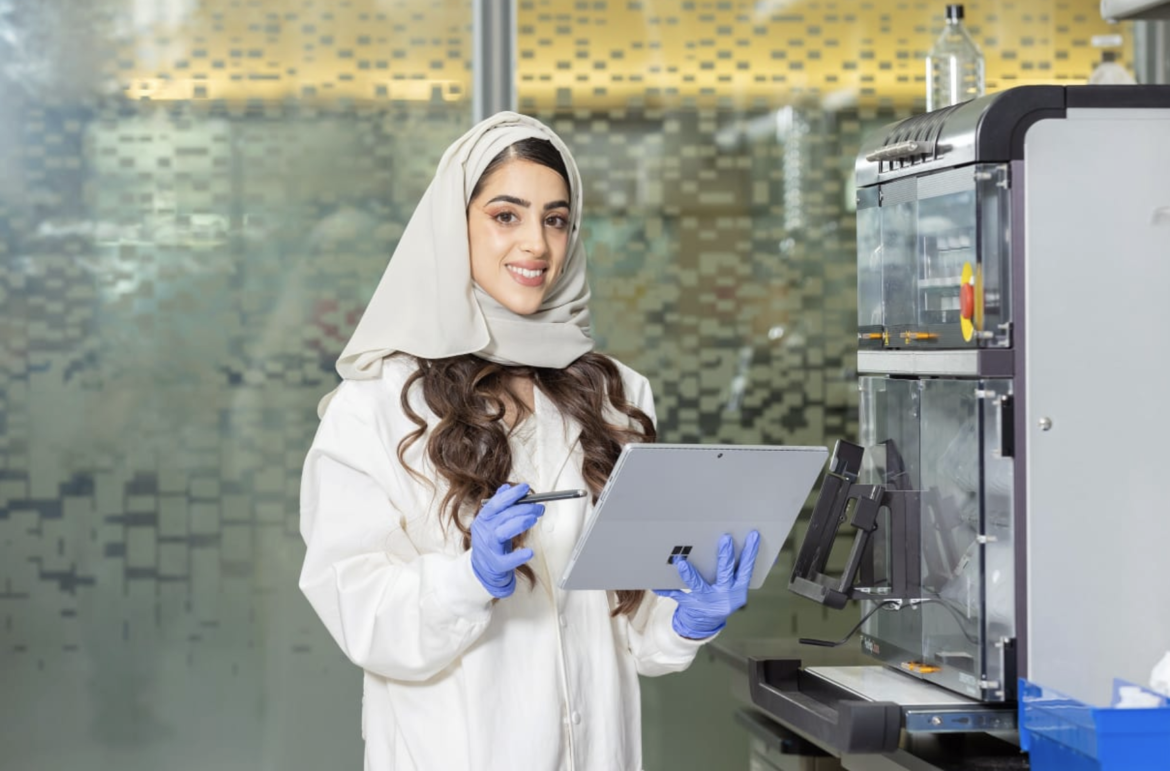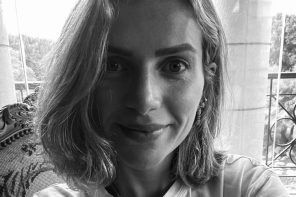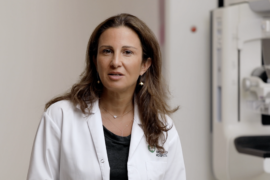Dana Alsulaiman is an Assistant Professor of Material Science and Bioengineering at King Abdullah University of Science and Technology (KAUST) and the Principal Investigator of the BioMAD Lab, which focuses on developing advanced biomaterials and next-generation technologies for minimally-invasive disease diagnosis and personalized therapy. Her research includes advancements in encoded hydrogel microparticles, smart microneedles, as well as optical and electrochemical point-of-care biosensors.
Outside of academia, Dr Alsulaiman strives to promote youth in STEM and foster international collaborations through her involvement in outreach programs, renowned youth forums, and international symposiums, most notably co-chairing the Precision Medicine session at the 2023 Arab-American Frontiers Symposium.
Please introduce our readers to your specialization field? And what does it entail?
My official title at work – that is, at King Abdullah University of Science and Technology (KAUST) in Saudi Arabia – is Assistant Professor of Material Science and Bioengineering; however, put simply, I’m a passionate scientist who has been given the opportunity and responsibility of educating and mentoring the next generation of scientists and engineers, while leading a highly interdisciplinary scientific research group, called the BioMAD Lab. My lab of 12 brilliant students and researchers (hailing from 8 different countries), all share a common goal: to develop cutting-edge materials and devices that solve real-world healthcare problems. In essence, we design and engineer advanced materials from soft jelly-like hydrogels to infinitely small nanomaterials and turn them into practical biomedical solutions, including portable biosensors for early disease diagnosis or smart materials for tissue engineering and personalized medicine.
And why did you choose this career path?
What initially drew me to this career is the ability to wear three hats simultaneously: teacher, learner, and explorer. Unlike many traditional career paths, I considered during my studies, this one doesn’t confine me to a single role or limit me to exploring one discipline or tackling one challenge. Here, I can delve into research while also sparking curiosity in the next generation of scientists and engineers.
Moreover, this career path and specific discipline resonated with me because of its potential impact on people’s lives especially through health and wellness. Many of us have seen the glucose monitoring devices diabetics use to monitor their sugar levels; the BioMAD lab is developing similar portable technologies to detect and monitor life-threatening diseases like cancer. The potential impact of such biomedical technologies on patients’ lives is what motivates us every day! In addition to innovation, we’re also fiercely committed to accessibility and sustainability. We actively strive to make our technologies more portable, user-friendly, eco-friendly, and more cost-effective than existing solutions, so they can be accessible to all and create impact on a global scale.
Growing up who was someone you looked up to and why?
It would be close to impossible to identify a single hero figure in my life growing up – instead, I’ve been fortunate to have encountered a collection of people who inspired me in one way or another. My philosophy is that every single person we encounter in our lives can offer us a lesson, a unique trait, or a spark of inspiration – we just need to take note. Take Mr. Hemmings, my high school math teacher whose interactive teaching style and infectious enthusiasm made learning an absolute joy and made me and my other female classmates feel confident and empowered in the world of STEM. My great-aunt, Dr. Farida, a renowned pediatrician, instilled in me a deep compassion for others and a passion for serving through the field of healthcare. Then there’s my grandmother, Taita Wafa, who leads with a different kind of strength – a feminine, compassionate, yet assertive leadership style that I deeply admire. My style of teaching, learning, growing, and leading is influenced by all these people. Still, every day, I continue to meet other inspiring individuals whose experiences nudge me to make further incremental yet lasting improvements to my life, both professionally and personally.
Tell us more about your academic route abroad; How enriching was it? Did you face any challenges?
My academic journey has been a whirlwind of enriching international experiences. After starting off my journey in Saudi Arabia, I flew to Canada to pursue my high school education then crossed the pond to the UK (specifically, Imperial College London) to pursue my university degrees from my Bachelor’s and Master’s degrees through to my PhD in Bioengineering. Before getting too comfortable in London, I traveled back to North America to pursue my postdoctoral research at MIT in Boston, MA. Each chapter of this journey has been enriched by the incredible people I met, the stunning places I visited, and the lasting relationships I forged with individuals of diverse backgrounds and perspectives.
While it was challenging at first, I learned to embrace the constant state of change and learn from it. I’ve realized that navigating through these experiences honed my abilities to be flexible and adaptable, to quickly forge new connections and relationships, and to thrive in diverse environments. Interestingly, I have come to recognize and appreciate that these skills, along with the knowledge I’ve gained, are extremely important in my field, which thrives on collaboration, adaptability, and innovative solutions.
Why did you decide to go back home to practice your profession?
It was never a decision to go back home, it had always been the intention. The question was just when. Before my parents sent me and my siblings to study abroad, they instilled in us a deep sense of purpose and responsibility – we knew that education could empower us to make a meaningful difference and positive impact on our community, our country, and ultimately on humanity.
The moment I realized it was time for me to return home was when I was conducting research at MIT. While I was brimming with ideas for projects and initiatives, I couldn’t help but sense the vibrant energy of Saudi youth back home who were all passionate about contributing to Saudi’s Vision 2030 – I wanted to be part of that collective effort and play an active role in that transformation.
Out of all your achievements and awards, which one is the most precious to your heart?
I’m extremely honored and grateful to have received the L’Oréal-UNESCO For Women in Science Young Talent Award as well as the Forbes Under 30 Middle East Award within the past year. While both awards are incredibly humbling, the achievement that I’m most proud of is one that offered me the chance to champion Saudi youth on a global stage, specifically during the 2024 World Economic Forum. In Davos, Switzerland, as part of a delegation curated by Misk Foundation, a Saudi non-profit organization empowering young minds, I had the incredible honor of participating in a panel discussion about reshaping the narrative surrounding Saudi youth. Sharing the stage with His Excellency Minister Adel Al-Jubeir and engaging with an international audience was a responsibility I carried with immense pride. This achievement wasn’t just about science; it was about bridging the gap between science and decision-makers, about using my voice – and amplifying the voices of Saudi youth – to create positive change and significant impact.
In a few words, describe the Saudi Woman of today…
The Saudi woman of today is a symphony of ambition, perseverance, and grace – she is a trailblazer who is rewriting the narrative about Saudi women and forging new paths with every step she takes and in every field she enters.
The Saudi woman of today is a daughter, a mother, and a sister but also a scientist, a doctor, an artist, an athlete, an entrepreneur, and a leader… I’m incredibly proud to be amongst such motivating Saudi women, whose stories are still being written, page by inspiring page.
Text by Victor Gee




